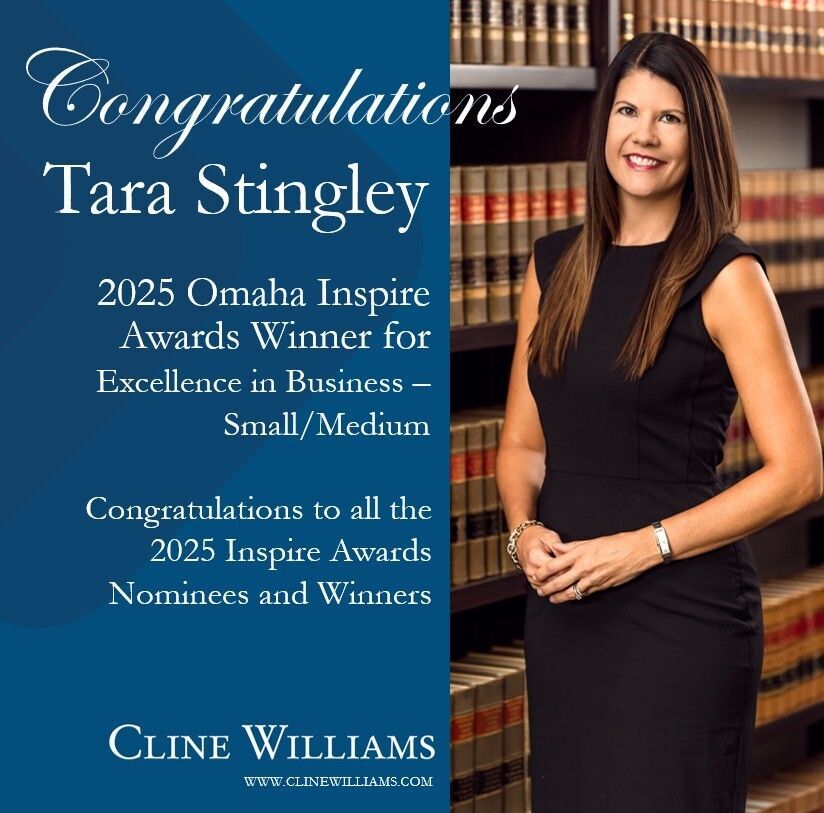On December 1, 2025, the U.S. Supreme Court heard oral arguments in Cox Communications v. Sony Music Entertainment, a case centered around the obligations of internet providers in addressing illegal actions by their users. Sony has sued Cox, rather than its users, for copyright infringement based on Cox’s failure to terminate the internet access of suspected copyright infringers. Sony won at trial and before the Fourth Circuit Court of Appeals, but during oral arguments, several SCOTUS Justices expressed reservations about holding Cox liable for the downstream actions of its subscribers.
Cline Williams is pleased to announce the firm has been recognized by Best Lawyers® "Best Law Firms" 2026. The firm received 20 rankings overall for the Lincoln and Omaha Metropolitan areas. 15 of the practice areas achieved first-tier metropolitan rankings and 5 received second-tier rankings.
Best Lawyers® “Best Law Firms” rankings are based on a rigorous evaluation process that includes the collection of client and lawyer evaluations, peer review from leading attorneys, and review of additional information provided by law firms as part of the formal submission process. A firm must have at least one lawyer recognized in the latest edition of The Best Lawyers in America® to be eligible for "Best Law Firms".
Cline Williams partner, Tara Stingley, has been named the winner of the 2025 Omaha Inspire Award for Excellence in Business – Small/Medium, announced during the October 29 luncheon at the CHI Health Center.
On September 19, 2025, President Trump issued a proclamation restricting the entry of anyone seeking to enter or reenter the U.S. in H-1B status without payment of a new $100,000 fee. The proclamation, titled Restriction on Entry of Certain Nonimmigrant Workers is effective date is 12:01 a.m. EDT Sunday, September 21, 2025, and is set to expire after one year.
Cline Williams Wright Johnson & Oldfather is proud to announce that three attorneys were named “Lawyer of Year” in the Best Lawyers in America® 2026 edition.
The U.S. Copyright Office recently released a pre-publication version of Part 3 of its Copyright and Artificial Intelligence Report series. This report focuses on training materials used to train generative artificial intelligence (“AI”), and whether developers need licenses to use third-party copyrighted works. The USCO explained that sometimes developers will need to license third-party copyrighted works, and sometimes will not need to license those works, depending largely on whether the use is considered fair. While recognizing the merits of potential government intervention to spur licensing, the Office concluded that market development of creative licensing solutions on a case-by-case basis is the best current option.
Cline Williams is proud to reveal that 30 of the firm's lawyers are listed in the Best Lawyers in America® 2026. Best Lawyers in America® are chosen through an extensive peer driven evaluation. Lawyers are recognized for their professional excellence in their area of practice. Best Lawyers: Ones to Watch, listed 3 of our attorneys. The listed lawyers, who are early in their careers, are recognized for their outstanding professional excellence in private practice.
Cline Williams is also proud to announce that three firm attorneys were selected for inclusion in the Best Lawyers in America® 2026 as “Lawyer of the Year” in their respective practice. They received this distinction based entirely upon peer ratings. Only a single lawyer in each practice area and designated metropolitan area is honored as a “Lawyer of the Year."
Cline Williams is honored to announce that partner Don Janssen has been ranked in the 2025 Chambers High Net Worth Guide for Private Wealth Law: Nebraska.
On November 5, 2024, Nebraska voters approved Initiative 436, also known as, the Nebraska Healthy Families and Workplaces Act (the “Act”). On May 28, 2025, the Nebraska Legislature passed LB 415, which clarifies and amends the Act. Employers should be aware of the changes made by LB 415 and begin preparing to comply with the Act as amended.
Cline Williams is honored to be ranked by the Chambers and Partners 2025 USA Guide. Nine attorneys in six Nebraska practice areas are being recognized. In addition, three of the firm’s practice groups are ranked.
On March 18, 2025, the U.S. Court of Appeals for the D.C. Circuit issued a notable ruling in Thaler v. Perlmutter, No. 23-5233, 2025 WL 839178 (D.C. Cir. Mar. 18, 2025), affirming the U.S. Copyright Office’s denial of copyright registration for an image generated by artificial intelligence. Thaler reinforces a foundational element of copyright law: Copyright protection extends only to human authors. For those attempting to navigate the evolving intersection of intellectual property and artificial intelligence, this case offers a certain degree of clarity but leaves several important questions unanswered.
On February 26, 2025, the U.S. Supreme Court ruled in Dewberry Group, Inc. v. Dewberry Engineers Inc. that the Lanham Act’s trademark-infringement remedy of disgorgement of the defendant’s profits is limited to the profits of a named defendant only, and does not extend to affiliated entities who may also have profited from the defendant’s infringing conduct.
The United States District Court for the District of Delaware has revised a prior summary judgement order, broadly holding that a party seeking to train non-generative AI with protected works did not make a fair use of the material and was required to obtain a license. At issue here, the court found that Westlaw’s headnotes and KeyCite system were original, protectable works. The Court then found infringement because the training materials the defendant used to train its AI product copied Westlaw’s works, and because the use of non-generative AI did not amount to a transformative fair use.
Mark A. Christensen, a Senior Partner at the law firm of Cline Williams Wright Johnson & Oldfather, and NDCA 2023 Defense Counsel of the Year, is shifting the focus of his practice to mediation and arbitration. Mark began conducting mediations in 1995 and has successfully served as a mediator in personal injury, commercial litigation, estate and employment cases in Nebraska and throughout the region. Mark has served as an arbitrator in construction and employment disputes.
The U.S. Department of State (DOS) has released an update of the J-1 Exchange Visitor Skills List (“Skills List”) effective December 9, 2024. The J-1 visa is the most consistently used visa for postdoctoral fellows at U.S. universities, medical centers, and research organizations. Many U.S. institutions fill over half of their postdoctoral research positions with J-1 exchange visitors. The revised list removes a large number of countries and broadens opportunities for current or former J-1 nonimmigrants to remain in or return to the United States.
On November 15, 2024, the United States District Court for the Eastern District of Texas set aside and vacated the U.S. Department of Labor's (DOL) final rule that increased the Fair Labor Standards Act’s (FLSA) salary level-threshold for the “white-collar” exemptions to overtime requirements. The court’s ruling applies nationwide to all employers who are subject to the FLSA.
Cline Williams is pleased to announce the firm has been recognized by Best Lawyers® "Best Law Firms" 2025. We received 19 rankings overall for the Lincoln and Omaha Metropolitan areas. 13 of the practice areas achieved first-tier metropolitan rankings and 6 received second-tier rankings.
Best Lawyers® “Best Law Firms” rankings are based on a rigorous evaluation process that includes the collection of client and lawyer evaluations, peer review from leading attorneys, and review of additional information provided by law firms as part of the formal submission process. A firm must have at least one lawyer recognized in the latest edition of The Best Lawyers in America® to be eligible for "Best Law Firms".
On August 30, 2024, the Occupational Safety and Health Administration (OSHA) published a proposed rule for a new OSHA standard: Heat Injury and Illness Prevention in Outdoor and Indoor Work Settings.
Currently, there is no specific standard that regulates heat stress hazards in the workplace. Rather, OSHA currently protects workers from heat risk under OSHA’s General Duty Clause. OSHA cites the need for a standard to protect workers from persistent and serious hazards posed by heat exposure, as fatalities due to environmental heat exposure have increased in recent years. Industries experiencing frequent hospitalizations and fatalities due to heat exposure include construction, manufacturing, landscaping, agriculture, and postal and delivery service. OSHA also identified certain risks which lead to heat exposure fatalities, such as leaving employees alone after heat exposure symptoms begin, a lack of water and shade on-site, and no programs to acclimatize employees to hot work environments.
On August 20, 2024, the United States District Court for the Northern District of Texas set aside the Federal Trade Commission’s (“FTC”) proposed ban on non-compete agreements, holding the FTC’s non-compete rule “shall not be enforced or otherwise take effect on its effective date of September 4, 2024 or thereafter.”
Cline Williams is proud to reveal that 34 of the firm's lawyers are listed in the Best Lawyers in America® 2025. Best Lawyers in America® are chosen through an extensive peer driven evaluation. Lawyers are recognized for their professional excellence in their area of practice. Best Lawyers: Ones to Watch, listed 7 of our attorneys. The listed lawyers, who are early in their careers, are recognized for their outstanding professional excellence in private practice.
Cline Williams is also proud to announce that four firm attorneys were selected for inclusion in the Best Lawyers in America® 2025 as “Lawyer of the Year” in their respective practice. They received this distinction based entirely upon peer ratings. Only a single lawyer in each practice area and designated metropolitan area is honored as a “Lawyer of the Year."
Cline Williams is honored to be ranked by the Chambers and Partners 2024 USA Guide. Nine attorneys in six Nebraska practice areas are being recognized. In addition, three of the firm’s practice groups are ranked.
The federal Pregnant Workers Fairness Act (the “PWFA”) was enacted on June 27, 2023. Thereafter, the United States Equal Employment Opportunity Commission (the “EEOC”) began the rulemaking process on regulations implementing the PWFA. On April 15, 2024, the EEOC issued those regulations, which provide guidance to employers on how to comply with the PWFA. The regulations are effective on June 18, 2024.
On April 23, 2024, the U.S. Federal Trade Commission (“FTC”) announced a final rule, Non-Compete Clause Rule, which implements a nationwide ban on non-compete agreements for the vast majority of the American workforce. The final rule is currently set to take effect 120 days after its publication in the Federal Register. However, legal challenges to the FTC’s final rule have already begun, making the rule’s actual effective date uncertain.
On April 23, 2024, the U.S. Department of Labor (DOL) announced an increase to the Fair Labor Standards Act's (FLSA) salary-level threshold for the “white-collar” exemptions to overtime requirements. The DOL’s final rule expands overtime pay protections to over 4 million workers by changing the FLSA’s exemptions to overtime eligibility.






